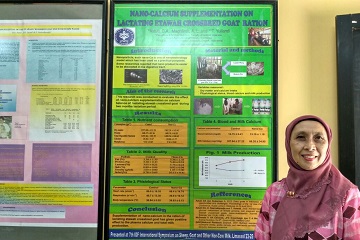Professor of IPB: Livestock Welfare Determined the Quality of Meat

Livestock welfare would be fulfilled when the animal rights could be minimally met. There were five principles of the animal welfare, i.e. free of hunger and thirst, free from discomfort, free from pain, free from fear and stress, and the latter free to express nature’s behavior. When animals had fulfilled the principles, then it could be said that the animals could get their welfare.
Not only for the ordinary animal, in the livestock its welfare also needed to be considered. Especially the animals that became one of the instruments in a knowledge, both the farm animals for the practicum and the research.
Professor of Department of Science of Nutrition and Feed Technology (INTP), Faculty of Animal Husbandry (Fapet), Bogor Agricultural University (IPB), Prof.Dr. Dewi Apri Astuti, said that there should be the guidance or the guide book for the maintainance and the direction in the treatment of the livestock. According to her, the poor treatment could reduce the quality of meat products and could even occur the deaths from the animals that stressed.
There were several points to consider during the use of the livestock both as the researcher and for the practicum. First, it was necessary to make good facilities (cages, places to eat and drink), safe, comfortable and wide enough for the livestock. Other than that, it also needed a good environment such as the forage where the animals could get out of their cages and have the exercises.
Second, to keep in mind about the feed and the drinking water. The number and type of the feed were needed to be considered both after the research and before the research, so the animals could stay alive. Third, the care when conducting the research and practicum activities. The researchers who did this needed to be accompanied by an animal care specialist, thus to avoid the occurrence of the accidents due to the animals felt uncomfortable and hurt.
Fourth, it was very important to note that the process of moving the livestock from one place to another. It was needed the adequate transportation where the animals could feel comfortable during the trip. Because currently in the streets there were many that we could see the animals transported by the transportation with no regard for the comfort of the animal, which in the long term could affect the health of the livestock and could even cause death.
Fifth, the enrichment. All types of the animals had different types of the enrichment with each other, for example the poultry animal would not hold up the strong winds when it was still young, so it needed a warmer cage. Each animal had a special characteristic, so it was necessary to know what kind of enrichment for a particular animal that would be used as the research and the practicum.
The last point was that a good wind circulation was necessary for the animals. Especially for the ruminant animals (such as cows and goats) which could produce high ammonia gases. Other than that, it was needed to know that the nature of the farm animals, did they like to cluster or be in solitary (alone), so as not to cause the animals to be stressed out of the loneliness.
“IPB has an animal welfare committee called the Animal Ethics Commission (KEH) headed by drh. Ni Wayan Kurniani Karja, MP, Ph.D, consisting of several members in which there were several experts, both the experts in animal care and the animal experts,” said Prof. Dewi.
Forward, hopefully there was a guide for the students and the researchers to be a reference in the maintenance of the livestock as a research animal as well as a practicum. Therefore, the research could work well by providing the primary basic needs of the livestock.(GG/NM)



